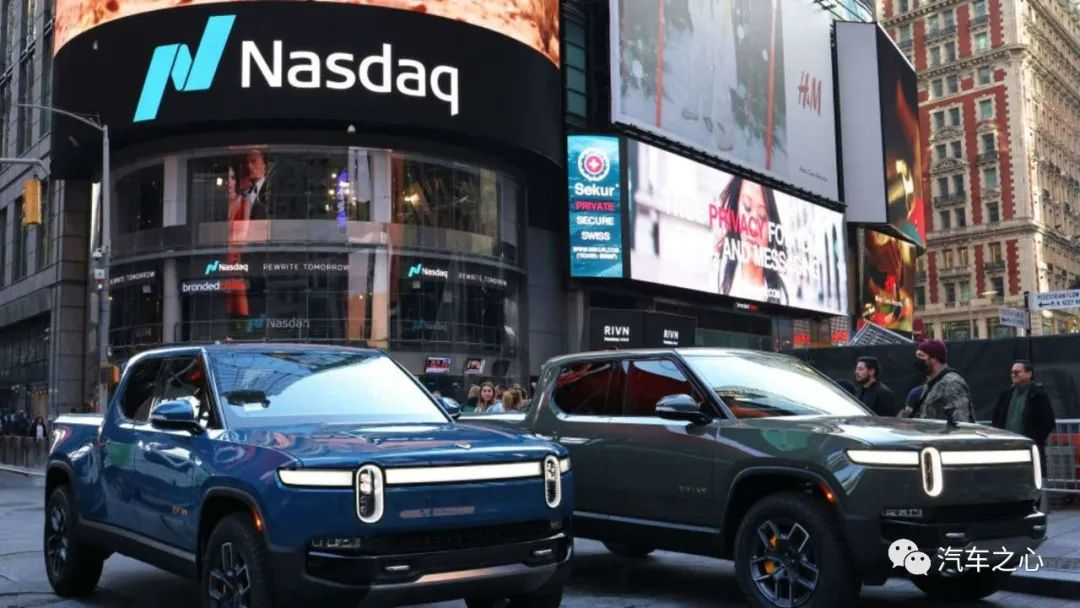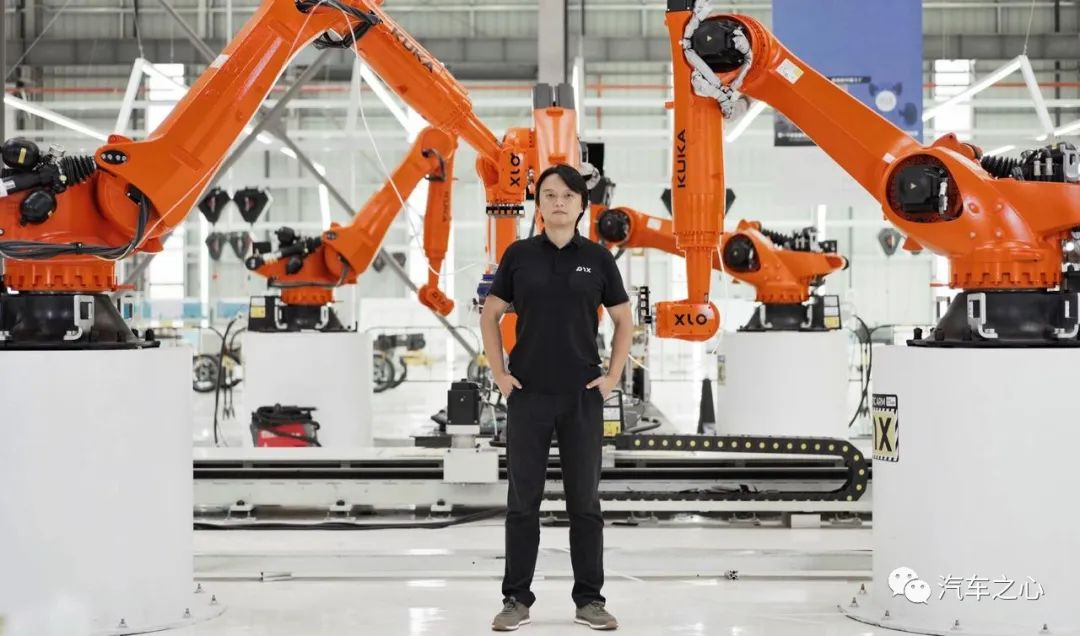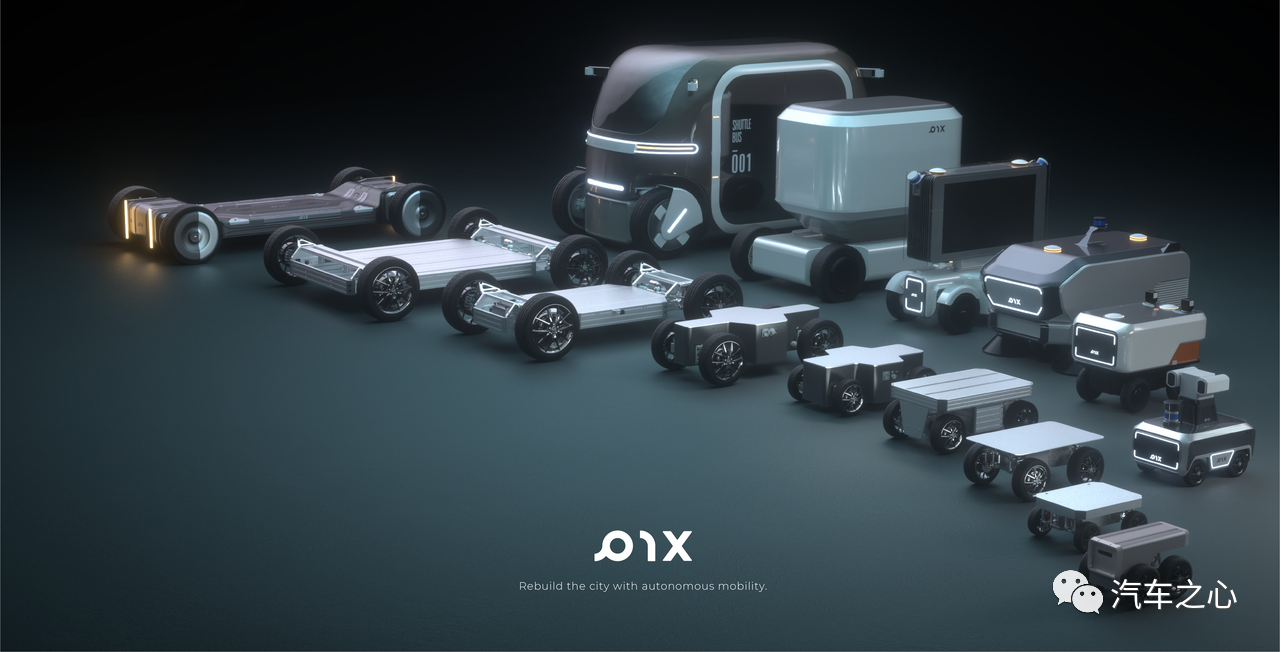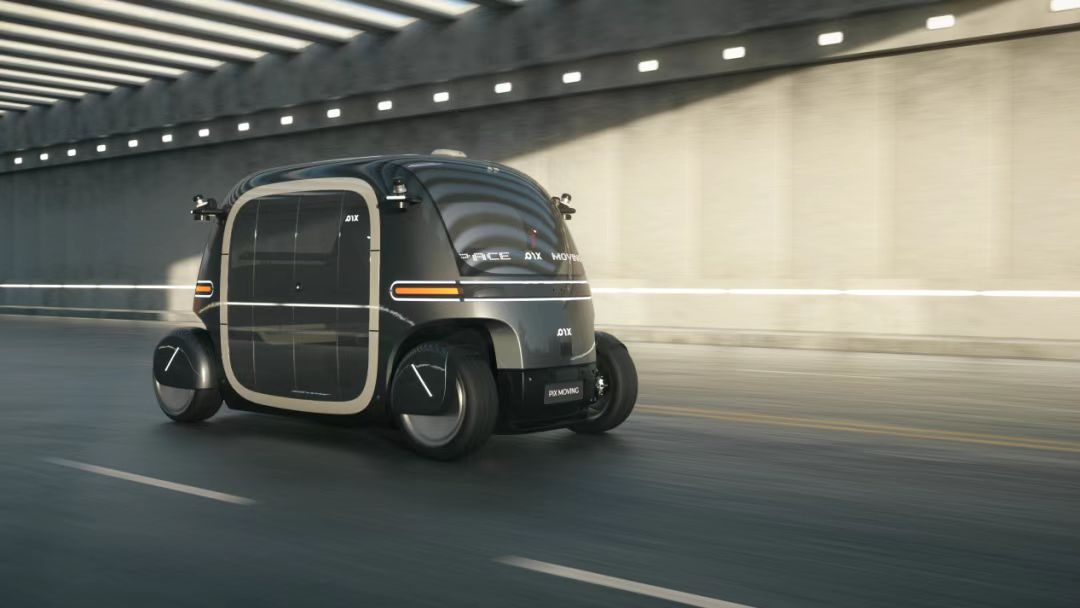Author: Tian Xi
In 2022, the heat of skateboard chassis continues to spread.
On July 11, PIX Moving, a company specializing in the development and manufacturing of autonomous skateboard chassis and vehicles, announced the completion of its Series A round of financing. The round was led by TIS Corporation, a large IT systems integrator and listed company in Japan, with funds mainly used for the mass production of skateboard chassis, Robobuses (autonomous minibuses), unmanned cleaning robots, and further research and development of autonomous driving technology. The goal is to deliver products to customers in bulk and continuously promote the layout of international markets.
Back 6 months ago, PIX Moving had just received nearly CNY 100 million in Pre-A+ round financing.
Previously, the company had received angel investment from SOSV, a Silicon Valley venture capital fund, and Pre-A round investment from listed A-share company Kansen Shares.
The successive financing obtained by PIX Moving reflects to a certain extent the capital market’s optimism about skateboard chassis.
In fact, since the listing of Rivian in 2021, which has earned a market value of hundreds of billions of dollars, skateboard chassis technology has been drawing great attention from the market. People are curious about what concept it is and how it enables a company with sales of less than 160 cars to gain unanimous recognition from financial giants.
At the same time, some industry insiders stand on the sidelines watching calmly. They are more concerned about whether skateboard chassis, as a new model, can succeed in the highly competitive automotive industry and achieve a commercial closed loop.
However, brave entrepreneurs have never been bothered by these two voices. They are more inclined to jump into the water and deal with problems in the development process. Moreover, it seems that more and more funds are also willing to join in and take a gamble with these entrepreneurs, exchanging for an unclear tomorrow.
2021 Global Largest IPO Ignited Skateboard Chassis
When it comes to skateboard chassis, Rivian is an unavoidable figure. It’s even safe to say that it’s Rivian that ignited the skateboard chassis.

Time goes back to November 10, 2021. Rivian, an electric vehicle manufacturer, went public on the Nasdaq, raising $12 billion, making it the largest IPO globally that year.
Regarding market capitalization, Rivian has set unprecedented records. Not only did its market value on the first day of trading surpass that of traditional automotive brand Ford, but also it kept breaking records in the following days, surpassing General Motors and Volkswagen. At one point, its market value exceeded $140 billion, ranking third among global automobile companies, only behind Tesla and Toyota.# Rivian Wins With its Skateboard Chassis
Rivian has achieved an enormous market capitalization not by sales, in fact, it only delivered 156 vehicles before going public. This is a far cry from the multimillion, even billion, unit annual sales figures of established automakers.
The key weapon for Rivian is its skateboard chassis, a revolutionary design for traditional automotive chassis that is tailored for the age of electric vehicles.
In the eyes of the capital market, the century-old automobile industry is experiencing a historic transformation, and Rivian’s skateboard chassis, as an advanced production force, will play a revolutionary role and dominate the new power structures, for which they are willing to invest heavily and gamble on their future.
So what exactly is the skateboard chassis?
This is a chassis architecture designed specifically for electric vehicles that integrates battery, electric powertrain, suspension, brakes, and other components into a skateboard-like chassis, achieving an integrated design.

Since there are no conventional components such as engines or transmissions embedded in the vehicle body, the skateboard chassis achieves decoupling of the upper and lower bodies, which means that the upper and lower components can be independently developed on the same chassis platform. This not only greatly reduces the cost of developing chassis parts and molds but also shortens the development cycle for new vehicles.
In simple terms, with the skateboard chassis, making cars is as easy as playing with building blocks.
Because of its universality and versatility, the skateboard chassis is referred to as a vehicle development platform within the industry. For example, R.J. Scaringe, the founder and CEO of Rivian, has stated in an interview that the skateboard chassis platform is the core of all Rivian electric vehicles.
It is understood that the first-generation two-row five-seater pickup truck model, R1T, under the Rivian brand, was developed on the Skateboard Platform. It integrates all the components such as motors, BMS system, cooling system, suspension system, and hydraulic control system into the module in the middle of the chassis. The beam of the Pickup was widened to both sides to form a flat base, while the upper body was left to the designer’s imagination.
There is a four-motor version of the R1T that can achieve tank-like steering (turning on the spot), which is impressive for its powerful off-road performance and flexible body layout.
In 2018, the R1T was unveiled at the Los Angeles Auto Show, attracting the attention of giants such as Amazon and Ford Motor.
Amazon founder Jeff Bezos personally visited the Rivian company for inspection and led a $700 million investment in Rivian in February 2019, followed by an order for 100,000 vehicles.Two months later, Ford followed suit and invested 500 million dollars in Rivian.
Since then, Rivian has gained a reputation in the car manufacturing industry, attracting attention from multiple sources of capital. Prior to the IPO, it had already raised billions of dollars in financing.
“The greater significance of Rivian’s model is to make the development of new models easier and more efficient,” according to an industry insider. The pace of traditional car companies launching new models every 3-5 years is no longer keeping up with the times in the era of electrification and intelligence. Based on a skateboard-style chassis, the development time for a complete vehicle from 0 to 1 can be reduced to less than a year.
For example, Rivian’s R1T and another three-row seven-seat SUV model R1S, as well as a commercial vehicle Van, are almost simultaneously advancing. Meanwhile, Tesla, which is at the forefront of the electric vehicle industry, has launched new products on average every three years: Model S (delivered since 2012), Model X (delivered since 2015), Model 3 (delivered since 2017), Model Y (delivered since 2020).
“Traditional car undertaker,” “chassis revolution”…for a time, the market was full of praise for Rivian. Star analyst Adam Jonas at Morgan Stanley even believed that Rivian would break Tesla’s dominance in the electric car market. However, judging from what happened later, it wasn’t that simple.
2022, A Big Breakthrough for Domestic Skateboard Chassis Players
First of all, it should be pointed out that Rivian is not the only player in the skateboard chassis field.
New car manufacturing enterprises such as Canoo from the US, Arrival from the UK, REE from Israel, as well as PIX Moving, Yika Zhiche, and Youpao Technology from China are all betting on the skateboard-style chassis platform.
Taking Canoo as an example, the company was founded in 2017 by Stefan Krause and Ulrich Kranz, both of whom have been immersed in the automotive industry for many years, especially the latter, who has led the development of BMW Z3, the first SUV X5, and the BMW electric product line i-series.
At the beginning of its establishment, Canoo set its sights on the development of skateboard-style chassis. In 2019, it launched its first model, the Lifestyle Vehicle, based on the skateboard-style chassis.
This is a mini bus that emphasizes space, similar to a mobile glass house. All the space above the chassis can be utilized. Due to its unique appearance and chassis design, it quickly caused a sensation in the market. Afterwards, Canoo successively launched the MPDV multi-purpose delivery vehicle and the Canoo electric pickup.
Canoo has stated that compared to traditional fuel trucks, the MPDV electric truck with its skate platform’s wire-controlled steering system can achieve a smaller turning radius, making the truck more flexible when maneuvering through the city.
In early 2020, there were reports that Hyundai Motor intended to collaborate with Canoo to create an electric vehicle platform relying on its skateboard-style platform architecture for the production of Hyundai and Kia’s small passenger cars.
Later that year, news came out that Apple was interested in acquiring Canoo, with the goal of obtaining its skateboard-style chassis technology. However, both collaborations ended without any results.
REE is also a highly anticipated company in the skateboard-style chassis field, stressing highly modular and flexible combinations.
It is understood that on REE’s website, there is a configurator that, with just a few mouse clicks, can configure a customized vehicle chassis solution.
Looking back home, there are also many skateboard-style chassis players, and the financing party this time–PIX Moving–is one of them.
PIX Moving’s founder, Yu Chuan, was originally an entrepreneur in the unmanned aerial vehicle field. In 2012, his aerial drone Hexbot, received a crowdfunding amount of $570,000 on Kickstarter, ranking first in Asia and selling to more than 100 countries worldwide.

In 2017, he inadvertently entered the field of unmanned driving from the unmanned aerial vehicle track. In his view, autonomous driving technology is leading a car revolution, and cars will become the infrastructure of smart cities, not just means of transportation. Additionally, the intelligent chassis will play a core role in the future of the industry.
Therefore, starting with a general skateboard platform, Yu Chuan developed key skateboard chassis technologies such as “distributed drive, wire control redundancy, data fusion, perception decision-making, and 360-degree turn units.”
In 2019, PIX Moving developed the world’s first 3D-printed “autonomous driving skateboard chassis;” in November 2021, they released the 2nd generation skateboard platform.
One of PIX Moving’s released products, Robobus, was built based on the 2nd generation skateboard-style chassis and is the world’s first Robobus built on skateboard platform.From a structural perspective, this Robobus model removes the traditional cockpit and replaces it with two rows of seats facing each other, without a steering wheel, gearshift, pedals or other components. Therefore, it is more accurate to say that it is a space that can move in both directions, rather than a car.
What is worth mentioning is that the development cycle of this model is less than a year.
The PIX Robobus mass production is currently progressing, and it has received intention orders from customers in many countries around the world, including China, Spain, the United States, the United Kingdom, South Korea, and Australia. Domestic orders have already begun to be delivered gradually, and the first overseas Robobus will be delivered to Spanish customers soon.
With the new US regulations (allowing autonomous vehicles to be without a steering wheel), it is expected that this model will see a significant increase in sales in the US. PIX Moving plans to deliver 1000 units globally within 1-2 years.
Yika Smart Car is also a well-known player in the skateboard chassis field.
Founded in 2018, Yika Smart Car is based on the core technology of the skateboard chassis, “full-line control + true intelligence + integrated die-casting.” It has launched multiple chassis models in the market. However, unlike PIX Moving, Yika Smart Car focuses on the mid-to-low-speed skateboard chassis and is aimed at the B-end unmanned delivery market.
In April 2022, Yika Smart Car announced that it had completed nearly RMB 100 million in Series A and A+ financing, respectively invested by Fenxin Investment, Silicon Harbor Capital, and following investors from old shareholders, Chentao Capital.
Another company shining in the capital market is a skateboard chassis company called Youpao Technology. It was founded by the former CEO of Great Wall Salon Zhixing, Li Peng, in April 2021. Within only 5 months of its establishment, it has completed three rounds of financing, including personal investor Horizon founder Yu Kai, President of Fuxing Automotive Technology Group Wang Lipu, and self-driving expert Gu Junli, as well as financial investment institutions such as J-Win Capital, CCV Genesis Partners, ZhenFund, and industry capital Bosch China.
From online information, Youpao Technology is based on the research and development of intelligent electric vehicle chassis to create customized vehicle models for customers.
In January 2022, Youpao Technology released the UP Super Chassis and three UP SPACE Super Cabin concept cars.
Among them, the UP Super Chassis is upgraded from the skateboard chassis, which changes the traditional vehicle development from “integrated vehicle” to “upper and lower split type,” and the development cycle can be shortened by 6-12 months.Founder and CEO of Youpao Technology, Li Peng, stated: “It (the super chassis) can change my business model, it can make my car production cost structure different from before, it can make cars that used to cost 40 billion yuan either better than before or can be produced with only 4 billion yuan.” According to the plan, UP’s super chassis will be mass-produced in just over a year.
The list of players entering the skateboard chassis market is still expanding. In February 2022, Topu Group announced the establishment of a subsidiary to enter the skateboard chassis market, with a registered capital of 2 billion yuan. In the same month, Altair took a stake in the establishment of Lizard Technology, which focuses on skateboard chassis technology and products.
This is how a startup fever for skateboard chassis, which originated from the United States, quickly spread to China across the ocean, and it has become even more intense.
Two different realities: half flame and half seawater
On the other hand, many people have become vigilant.
The reason behind this is not difficult to understand. As a benchmark enterprise in the skateboard chassis market, Rivian’s performance did not meet expectations.
The financial report shows that in the first quarter of 2022, Rivian produced a total of 2,553 cars and delivered 1,227 cars, only half the production quantity. This contrasts with the industry’s shortage of car production capacity and strong sales volume.
In the capital market, Rivian has suffered consecutive setbacks, with its stock price falling from a peak of $179 per share at its IPO to $31.99 per share (as of the closing price on July 8), and the market value shrinking by more than 80% to $28.8 billion. News reports have indicated that Ford and other shareholders have sold off their holdings and exited at a loss.
Another leading enterprise in the industry, Canoo, also faces multiple crises. Not only did it experience its Co-founder and CEO Ulrich Kranz being hired away by Apple in 2021, but it also saw a large number of executives leave in 2022, including vehicle project leader Nicolas Leblanc, software control leader Richard Walker, as well as powertrain and battery production leader Steven Offutt.
Moreover, in terms of business, Canoo generated zero revenue in the first quarter of 2022, meaning it did not sell a single car.
Currently, Canoo has only $120 million in cash and cash equivalents, and according to its latest 8-K filing submitted to the US SEC, the company is currently facing a severe cash crunch crisis.
Are Rivian and Canoo facing a temporary setback in the market or are there problems inherent in the skateboard chassis model itself?
In fact, when the skateboard chassis was first rising, there were many doubts within the industry. Among them, the most heated debate was: who should the skateboard chassis manufacturers sell their products to?CTO Bai Junbo of E-car company Yika Smart Car stated that the skateboard chassis has reshaped the division of labor in the automotive industry, inserting a new ecological chain between downstream host manufacturers and upstream Tier 1 suppliers, which may lead to structural changes in the entire industry.
Especially in the field of passenger cars, the chassis is still the core technology of the host manufacturers. For the host manufacturers, it is difficult to accept a supplier who controls the huge value of the components. Moreover, with the thunderous rumors of “losing the soul”, if the chassis is outsourced, the host manufacturers will only be responsible for the role of designing the upper body structure, and lose even the “shell”, completely becoming an OEM factory.
Therefore, we can see that host manufacturers are constantly seeking initiative, such as Geely introducing the SEA Haohan platform, which is a highly original full-ecosystem architecture based on the hardware layer, system layer, and ecological layer, equivalent to firmly grasping the “soul” and “shell” in their own hands.
It is also difficult for new players in the car manufacturing industry to pay for third-party skateboard chassis.
In the current emphasis on full-stack self-development, many new car manufacturing companies have achieved integrated and modular chassis, and they are not lacking in chassis technology, and they are even less likely to accept a universal chassis.
Industry insiders analyze that tech giants in car manufacturing, such as Xiaomi, Apple, and companies like Baidu and Didi in the robotaxi industry, may be potential users of third-party skateboard chassis.
On the one hand, these companies’ advantage lies in their development capability of advanced autonomous driving, but their engineering capability is not strong, and purchasing a skateboard chassis can quickly help them launch new models.
On the other hand, these companies need a high degree of standardization and strong universality for the chassis, which is exactly compatible with the characteristics of skateboard chassis suppliers.
UPEV Technology has just targeted this part of the market. Founder and CEO Li Peng classifies customers into two categories:
One is a group that originally had the ability to design complete vehicles and hopes to improve efficiency and reduce costs through the super chassis;
For the other group of customers, “if they do not have the ability to design and manufacture complete vehicles, but they need to serve a certain type of customer or scenario, we will design and manufacture cabins based on the skateboard chassis under their definition. Ultimately, the brand, user, and scenario are all theirs.”
Of course, skateboard chassis not necessarily be supplied to passenger cars. In fact, currently many on-field players are eyeing the commercial vehicle market.
Peng Xu, general manager of Changsha Yumon Technology, said that Yumon mainly focuses on the sanitation field, and its chassis load-bearing capacity and overall structure meet the needs of sanitation vehicles. For example, Yika Smart Car has formed four major scene systems of distribution, retail, security patrol, and cleaning.
In early 2022, PIX Moving reached exclusive strategic cooperation with Fulongma Group, and the jointly developed unmanned cleaning robot has been completed and is in the preparation stage for mass production.
However, there are also skateboard chassis providers who choose to take the initiative – to start car-making themselves.
Recently, Yu Chuan, the founder of PIX Moving, revealed in an interview with “Intelligent Vehicle Planet” that they are going to produce an electric A00-level small car with complete parameter definitions: two seats; 150km endurance; price range of 50,000 to 70,000 RMB; equipped with lithium iron phosphate battery; unable to fast charge but capable of battery swapping, which users can do by themselves.
As planned, this car will be first launched in the European Union and will keep the maximum speed within 90 km/h using PIX skateboard chassis. When pre-sales start in China in the 3rd and 4th quarters of next year, corresponding parameters will be adjusted accordingly.
Speaking of the initial intention to make cars, Yu Chuan frankly said that it is for “scaling up”, and if they can reach 100,000 units, the cost can be almost amortized, and making cars is an important part for PIX Moving to sustain its development.
Meanwhile, PIX Moving continues to focus on the research and development of PIX Rover, a universal autonomous driving system. With a unified architecture, PIX Rover supports medium-to-low-speed passenger transportation and unmanned robot applications on closed, semi-closed parks, and open roads.
“In the period of industrial change, companies with core technology, products, and manufacturing tools can create value for users faster, and the change in development and manufacturing processes can promote the change of products,” said Yu Chuan, founder and CEO of PIX Moving.
If you look closely, the development trajectory of skateboard chassis is just like any new technology before a major outbreak, which is often accompanied by controversy and doubts in the early stages. People cheer and encourage it for its innovative ideas, but are disappointed and lost due to its unsatisfactory performance in the short term. In ups and downs, a large number of adventurous entrepreneurs search up and down between technical innovation and market exploration, and then bring a new technology to maturity.

This article is a translation by ChatGPT of a Chinese report from 42HOW. If you have any questions about it, please email bd@42how.com.
